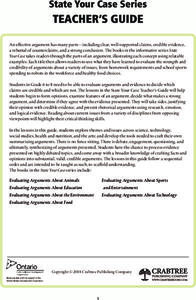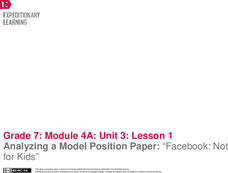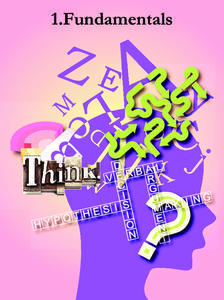Crabtree Publishing
State Your Case Series
Four lessons make up a unit focused on writing persuasive essays. Each unit builds on the last, ultimately taking pupils through the writing process. Scholars make a claim, create an argument, debate both sides, then state their opinion....
Facing History and Ourselves
The Audacity of a Vote: Susan B. Anthony’s Arrest
Susan B. Anthony's speech "Is It a Crime for Women to Vote?" takes center stage in a lesson that asks class members to consider how they might respond to what they consider an unjust law. Groups work through the speech paragraph by...
National Endowment for the Humanities
A Defense of the Electoral College
Each presidential election year, the debate about the electoral college rages. Michael C. Maibach's "A Defense of the Electoral College" offers young political scientists an opportunity to examine a reasoned argument for why the...
EngageNY
End of Unit Assessment: Tracing and Evaluating Arguments
Give water the attention it deserves. Scholars watch Corporations Need to Pay More Attention to Water and respond to questions as part of their end of the unit assessment. They then complete the assessment by reading and responding to...
EngageNY
Tracing and Evaluating Arguments: “The Future of Water” and The Big Thirst
Can scholars predict the future? They try as they first watch the video The Future of Water to capture details and trace the argument. Next, individuals complete the Tracing an Argument
note catcher to guide their thoughts. To finish,...
EngageNY
Evaluating an Argument in The Big Thirst
Don't argue with me! Scholars first evaluate the argument in The Big Thirst. Learners work with partners to determine if the text supplies enough evidence to support the claim. They then complete a Tracing an Argument Note catcher for...
EngageNY
Analyzing a Model Position Paper: “Facebook: Not for Kids”
It's time to take a position! Scholars learn to write a position paper by analyzing a model paper titled Facebook: Not for Kids. After studying the model paper, learners think about their own papers using the Position Paper Planner. They...
Missouri Department of Elementary
Conflict Mediation – Part 1: Getting Ready
Two scholars walk into a room arguing, what is happening? Peers observe the two actors in preparation for a whole-class discussion about conflict. Learners establish a conflict, name the three approaches—passive, aggressive, and...
Education Bureau of Hong Kong
Decision-Making
Designed to be included in the fourth lesson in the "Learning and Teaching of Critical Thinking Skills" series, this presentation models for viewers how to use the Decision Making worksheet to weight factors.
Education Bureau of Hong Kong
Decision-Making
Making decisions about things like what to do after high school can be a challenge. So many factors are involved. The decision-making worksheet in this resource helps to simplify the process by asking individuals to fill in a matrix for...
Education Bureau of Hong Kong
Mental Models
Critical to responsible decision making is becoming aware pre-conceived notions and biases that influence our perceptions. A colorful slide presentations asks viewers to consider these mental models that factor into their assumptions and...
Education Bureau of Hong Kong
Fundamentals of Critical Thinking
Analyzing arguments is key to critical thinking. Colorful slides teach viewers how to recognize the structure of an argument, the claims, and the validity of the evidence used to support an argument. Then, provided scenarios permit...
Education Bureau of Hong Kong
Fundamentals
"Fundamentals," the first lesson in a series of eight, introduces the basic concepts and strategies covered in a series of resources designed to teach high schoolers critical thinking skills. The worksheets and activities in this first...
Education Bureau of Hong Kong
Mental Models
Behaviors are often based on assumptions. That's the big idea in the third lesson of a series of critical think resources. Through a series of worksheets, learners examine the conscious and heretofore unconscious assumptions that...
Education Bureau of Hong Kong
Evaluating Casual Claims
Responsible decision making relies on the ability to a recognize, analyze, and evaluate claims. The worksheets and activities in this 32-page packet teach learners how to distinguish among opinions, reasoned arguments, facts, and logical...
EngageNY
Writing an Argument Essay: Gathering Evidence
Writers work on a plan for their argumentative essays using a Pygmalion Essay Planner to help develop a claim and counterclaim for their essays. They determine what information from the Eliza Character Tracker to incorporate and write it...
EngageNY
Writing an Argument Essay: Introducing the Writing Prompt and Model Essay
Scholars take a look at the difference between explanatory and argumentative essays by completing graphic organizers. They then determine how this difference applies to the Pygmalion writing prompt. Learners keep track of their writing...
EngageNY
End of Unit Assessment Parts 1 and 2: Evaluating Arguments and Claims
Which came first: the chicken or the egg? As part of the end-of-unit assessment for The Omnivore’s Dilemma, scholars watch a video about organic eggs versus conventional farm eggs. They use graphic organizers to collect evidence as they...
EngageNY
Evaluating an Argument: The Polyface Local Sustainable
Who has the better argument? Class members work in small groups to compare the arguments on the Example of Strong and Flawed Arguments sheet. They then analyze Michael Pollan’s argument on pages 161–166 of The Omnivore’s Dilemma and...
EngageNY
Close Reading: Brown v. Board of Education
What's the connection? Scholars complete a close reading of Brown v. Board of Education and identify connections to Carlotta in A Mighty Long Way. Classmates learn new vocabulary, answer text-dependent questions, and complete a...
EngageNY
Preparation for Performance Task: Practicing Presentations
Practice makes progress. Working in pairs, presenters rehearse and refine their presentation skills before the big day when they pitch their film choices. Rehearsing also allows for refining prompt cards based on peer feedback and...
EngageNY
Launching the Performance Task
This word or that, this picture or that. Individuals dive into the lives of The Little Rock Nine and the connotation used in the book A Mighty Long Way as they begin the performance task. The task scenario establishes literature lovers...
EngageNY
Writing an Argument Essay: Evaluating the Model and Crafting a Claim (Chapter 28, Including Synthesis of Scenes in Previous Chapters)
Scholars use the model essay from the previous instructional activity to create their own argumentative essays. Readers make a claim about Atticus defending Tom in To Kill A Mockingbird. They then use graphic organizers to develop and...
EngageNY
Analyzing the Model Essay: Studying Argument (Chapter 27 Plus Synthesis of Scenes in Previous Chapters)
Scholars partner up to review a model essay and talk through the process leading up to writing their essays. During a second reading of the essay, learners locate and underline the claim given, reasons, and counterclaim. They then...

























